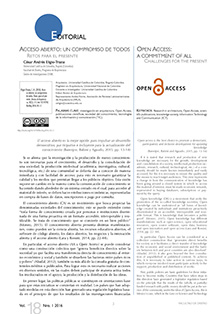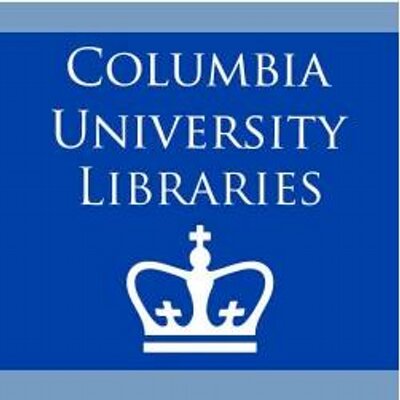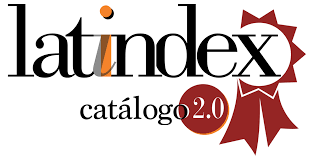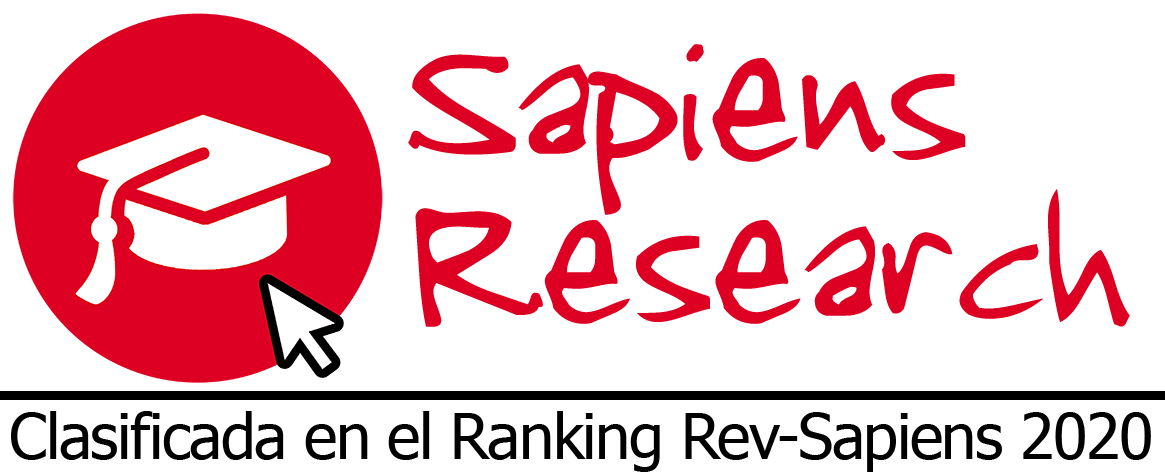

This work is licensed under a Creative Commons Attribution-NonCommercial 4.0 International License.
Revista de Arquitectura is an open access journal. More information...
Authors retain copyright and grant to the Revista de Arquitectura the right of first publication, which will be simultaneously subject to the Creative Commons (CC) BY-NC license.
Authors will sign a non-exclusive distribution license for the published version of the article by completing (RevArq FP03 Permission to Reproduce).
Self-archiving will comply with SHERPA/RoMEO guidelines and the Green classification.
To see in detail these guidelines, please consult...
Abstract
Open knowledge (OK) is a movement that seeks the promotion of the so-called knowledge societies; Open
knowledge can be understood as “all forms of knowledge created by individuals and institutions proactively
disseminated in an accessible, interoperable and reusable format. This is knowledge that becomes a public
good” (Moneo, 2015). Open knowledge has different manifestations, such as open science, open educational
resources, open source software, open data, business and open innovation and open access (Lara and Rossini, 2014, pp. 22- 44).
In particular, Open Access can be considered as a collective construction that “generates direct benefits
for society as it facilitates a direct transfer of knowledge to the economic and social environment and the barriers between rich and poor countries are also dissolved” (Abadal, 2012); it also goes beyond the free consultation of unpublished or published content. To achieve this, it is necessary to take action in various ways, in which everyone involved must participate actively in the support, production and distribution of works.

References
Abadal, E. (2012). Retos de las revistas en acceso abierto: cantidad, calidad y sostenibilidad económica. Hipertext.net. 10. Recuperado de: http://www.upf.edu/hipertextnet/numero-10/retos-revistas-en-acceso-abierto.html
Banerjee, I., Babini, D. y Aguado, E. (2015). Tesis a favor de la consolidación del Acceso Abierto como una alternativa de democratización de la ciencia en América Latina. En: Suber, P. Acceso Abierto. México: Universidad Autónoma del Estado de México. Recuperado de: http://ri.uaemex.mx/bitstream/handle/123456789/21710/Acceso%20Abierto.pdf;jsessionid=66AD3D63353F7A7FD6506BD4B0D2C0A1?sequence=5
Cabrera, K. I. (2015). Análisis comparativo de políticas públicas en modelos de acceso abierto en América Latina. El caso de Brasil y Argentina. RUSC. Universities and Knowledge Society Journal, 12 (1), 15-25. doi http://doi.dx.org/10.7238/rusc.v12i1.1947
Lara, J. C. y Rossini, C. (2014). La información y el conocimiento abierto en el contexto de la cooperación multilateral: aspectos clave para la revisión del Acuerdo Regional 7 de ALADI. Cuadernos de discusión de comunicación e información, 2. 1-64 Recuperado de: http://unesdoc.unesco.org/images/0023/002309/230986s.pdf
Moneo, A. (2015). Cinco conceptos clave del conocimiento abierto. Banco Interamericano de Desarrollo. Recuperado de: http://blogs.iadb.org/abierto-al-publico/2016/03/17/5-conceptos-clave-del-conocimiento-abierto/
Open Archives Initiative (OAI) (s.f.). Cornell University Library. Recuperado de: https://www.openarchives.org/
Packer, A. L., Cop, N., Luccisano, A., Ramalho, A. y Spinak, E. (Porgs.) (2014). SciELO 15 años de acceso abierto: un estudio analítico sobre acceso abierto y comunicación científica. (CC-BY-SA) París: Unesco. Doi: http://dx.doi.org/10.7476/9789233012370
Scholarly Publishing and Academic Resources Coalition (Sparc) and the Public Library of Science (Plos). (2013). How Open Is It? Espectro de acceso abierto. CC BY. Recuperado de: http://sparcopen.org/wp-content/uploads/2016/01/OAS_Spanish_web.pdf
































